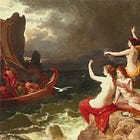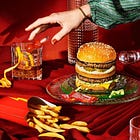Men who like bats: a takedown
Incoherent thoughts on bad writing & the continuation of the madonna/fallen woman dichotomy
If we considered modern western society as a christmas tree (bear with me), we would find a remarkable assortment of terrible presents tucked beneath its branches. Many of the gift tags will be signed, with love, from the problematic uncle that is the Victorian Era. Among these many non-returnable gifts is the concept of the madonna and the fallen woman - the false dichotomy sorting women into what is essentially a glorified naughty or nice list.
Cutting straight to the chase, this is why I couldn’t like Dracula. The premise is, of course, fantastic: Dastardly vampire lord plans to expand his base of operations to England, and is gallantly driven back by a band of makeshift heroes. The atmosphere and slow-burn horror is also impressive (albeit slightly less so when engaging with the text as a modern reader – I was never going to be shocked and appalled that the villain was a vampire. I’ve seen Buffy.) I was also entranced by the inexplicable cowboy that Bram Stoker included for the sake of seeming up to date with the latest literary trends, and loved the way they introduced new characters in the epistolic chapters ie. From Harker’s journal – I do miss my dear wife – to his wife’s journal – I’m so happy to see my dear friend – to the friend’s journal – THREE MEN PROPOSED TO ME TODAY – to letters between the three friends and so on and so forth. Cramming in three proposals was a truly iconic way to bring in new characters.
Where Stoker goes wrong, of course, is his blatant misogyny. Silly boy, classic Bram. It’s entirely possible that I should take into account the culture and social dynamics of the period – Bram was simply pickled in patriarchal ideology, after all, he may not have known any better! – but I shan’t. All misogynists are losers and creeps.
Stoker, himself, was particularly enamored by the madonna/fallen woman dichotomy. With the exception of the occasional nameless mother or homely innkeeper’s wife, Dracula has five characters who are women: Three of these are the wanton vampire mistresses who haunt Dracula’s castle. Another is sweet, pious Lucy, and the last is sweet, pious Mina. Both of the latter serve as a form of moral compass or true ingénue north for the various men around them.
Of these five characters, Lucy is the most interesting because the narrative charts her full transition to the other side of the dichotomy, as she is slowly turned into a vampire by the titular sucker. When we first meet Lucy, she is just so so pretty and such a nice person, accidentally breaking hearts and being oh so demure, and that is her entire character. While being preyed on by Dracula, she becomes weaker and weaker, despite the blood transfusions from her fiancée and other infatuated men (what would we do without men and their useful fluids?) and yet, for the most part, manages to maintain her cheery demeanour. However, the weaker she gets, the more we start to see signs of her imminent transformation in her emotional apathy, her elongated teeth, and the merest hints of expressing sexual desire. After Lucy’s tragic death, the transition is complete and she becomes a fully-fledged vampire - preying on children, looking hot, and being wanton (ABSOLUTELY THE WRONG TAKE but I’m offended that none of the vampiric women ate anything bigger than a child) – and the group of men formerly devoted to her rescue are now deadset on ushering her into a more permanent grave. The catch, of course, is that it’s for her own good. In Bram Stoker’s world, vampirism is a poor man’s sexuality, and for a ‘fallen woman’ the options for salvation are fairly limited: She can catch a boat to Australia and live out the rest of her days with an elderly female relative or, apparently, she can be mercy killed by a budding fraternity.
Say what you will about vampire mythology, but a group of men determining what should be done with a women’s body will never sit well.
After poor Lucy has permanently perished, Dracula turns his attention to Mina (she’s the only other woman in the book and Dracula is presumably a homophobic incel, so his options were limited). For the rest of the book, Mina serves the role of a virtuous, virginal figurehead against the forces of Satan or whatever, repeatedly insisting that the men mercy-kill her should she start to show the faintest vampiric inklings and pontificating about the virtues of such gallant men. Paris Paloma’s Labour comes to mind. The scene of Mina comforting her husband after she’s been attacked by Dracula is also…really something (naturally, he’s upset and in need of support after his wife was assaulted in her bed by a strange man).
It would be lovely to say that the trend of casting women in the role of the moral compass was a thing of the past, but sadly those Victorian presents just keep on giving.
I had the misfortune of watching Batman Begins a few months ago (not to be confused with Batman & Robin - a cinematic masterpiece) and the main thing that stood out to me was how intolerable I found the character of Rachel Dawes (also known as the only woman in the film). I was watching dialogue between Dawes and Bruce Wayne with only one of them getting on my nerves, and for some reason it isn’t the angsty one percenter?? That, dear friends, is the touch of a male writer. Because Rachel Dawes isn’t a woman - she’s a female character written by a man, created to serve one purpose: To be a moral compass for a temperamental furry.
This isn’t a woman, this is a patriarchal fantasy.
I loathe that I find Rachel Dawes irritating, because I know it’s for all the wrong reasons. She isn’t at fault, she’s just badly written. A modern madonna for men to be swayed by.
I want to see characters be annoying and well-written. I want to be cheesed-off yet still compelled. Let women in films be abrasive, or emotional, or frigid, or all of the above! Let them be stupid or brilliant, and still be loved and still be characters. Or to hell with that even, let a woman contribute nothing and still be worth it!
It’s time for some of those Victorian Christmas presents to be tossed into the bonfire, or at least set aside until someone is ready to use their critical thinking skills as they peel back the wrapping.
B.
Continue Reading:







